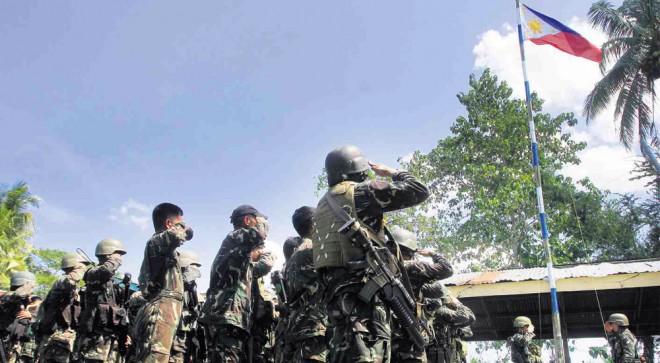Military leaders ‘axed missile deal for helmets’
SHARES: 4608
VIEW COMMENTS
By: Gil Cabacungan
@gilcabacungan
Philippine Daily Inquirer
06:13 AM July 7th, 2015
Philippine Daily Inquirer
By: Gil Cabacungan, July 7th, 2015 06:13 AM
The country’s top defense and military leaders have scuttled an Israeli weapons deal that was meant to be the Philippines’ primary defense against Chinese incursion in the West Philippine Sea, in favor of purchasing helmets, night goggles, body armor and radios to fight what they said was the more pressing threat of terrorism.
Documents obtained by the Inquirer showed that Defense Secretary Voltaire Gazmin, outgoing Armed Forces Chief of Staff Gen. Gregorio Pio Catapang Jr. and Army Commander Maj. Gen. Hernando Iriberri were responsible for removing the P6.5-billion shore-based missile system (SBMS) that was negotiated between the Israeli and Philippine governments in December 2014 from the list of military hardware to be purchased under the first phase of the revised Armed Forces modernization program.
Gazmin, Catapang and Iriberri obtained only last month the President’s approval in principle to realign the P6.5-billion budget for a new shopping list of military equipment, including 832 designated marksmen rifles worth P149.76 million (P180,000 each); two lots of chemical-biological-radiological-nuclear (CBRN) protective gear worth P103.402 million (P51.701 million each); and 32 long-range sniper weapons systems worth P17.28 million.
The new items proposed by Gazmin, Catapang and Iriberri were said to overlap with at least three of the items already listed for purchase in the P85-billion AFP modernization project from 2013 to 2017. These items were P1.116 billion for 4,464 units of night fighting systems, P433 million for 1,446 handheld radios and P144 million for 60 HF radio units.
A source familiar with the transactions, but who spoke on condition of anonymity due to the sensitivity of the information, said the purchase of the antiaircraft missiles from Israel was only waiting for the President’s final approval when it was suddenly removed from of the military’s shopping list.
The Department of National Defense and the Israeli Ministry of Defense spent years negotiating the contract, which was finalized on Dec. 18, 2014.
“They want to realign the funds because they want to earn a windfall from commissions. [The Israeli deal was] a government-to-government contract so there was zero commission],” the source said.
The source said the last-minute change in the procurement process came just weeks before Catapang’s scheduled retirement on July 10 when he reaches the mandatory retirement age of 56.
Iriberri, who was among the chief of staff nominees interviewed recently by President Aquino, used to be Gazmin’s senior military adviser and spokesman.
Documents showed that it was only last March that Gazmin had endorsed the acquisition of the missile system from Israel along with marksman and standard infantry rifles for the Philippine Navy as part of the revised AFP modernization program.
‘Review the deal’
The endorsement came after the President instructed Gazmin on Feb. 17 to review the SBMS deal with Israel to see if it complied with the Convention of Cluster Munitions.
Gazmin reportedly changed his tune after a meeting of military leaders in April in which Iriberri pushed to move the acquisition of the Israeli missiles to the second batch of acquisitions in the AFP modernization program, to be made by the next administration or from 2018 to 2022.
In a letter to Catapang, Iriberri said: “This is due to the rapid change in the internal security landscape brought about by the issues of the Bangsamoro Basic Law and the prevalent use of the IED (improvised explosive device) of the threat groups that inflicted significant casualties on our troops. The emerging security situation is further driven by the continuous military operations against the BIFF (Bangsamoro Islamic Freedom Fighters) and ASG (Abu Sayaff Group).”
Iriberri said that while the missiles were important to the country’s defense of the West Philippine Sea it was “more appropriate” to fill the “gaps” in the battlefield equipment of soldiers “in view of clear, present and continuing occurrences of terrorist acts.”
Iriberri’s recommendation prompted Catapang to fire off a May 18 letter asking Gazmin to remove the Israel missile system and replace it with Iriberri’s new shopping list. Gazmin approved the revision in a DND senior leaders meeting on June 10.
Gazmin, Catapang and Iriberri’s attempt to convince Aquino was successful as the realignment was approved in principle on June 15.
Three days later, Eal Ben Haim, acting president of Israel Military Industries, wrote President Aquino to remind him of the SBMS contract.
“We optimistically hope for the timely issuance of the notice of award and contract for your SBMS acquisition so that we may be honored to have the SBMS infrastructure realized, delivered, and installed during your incumbency and just in time for the Apec (Asia Pacific Economic Cooperation) meeting in the Philippines,” he said.
According to Haim, the Israeli government used the SBMS as “formidable defense and tested interceptor.”
The Inquirer tried but failed to contact Catapang for comment.
Read more: http://newsinfo.inquirer.net/703418/military-leaders-axed-missile-deal-for-helmets#ixzz3fFDQjOp8
Follow us: @inquirerdotnet on Twitter | inquirerdotnet on Facebook

No comments:
Post a Comment